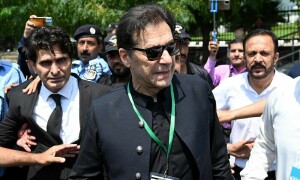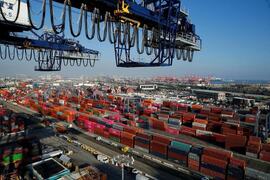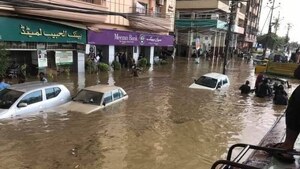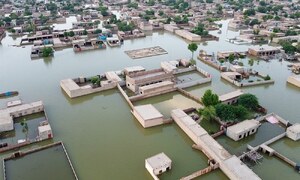When things go badly in a war it is not unusual for those on the losing side to look for a scapegoat to pin the blame. With the resurgence of the Taliban in Afghanistan, the Karzai government as well as some people in the West, have started blaming Pakistan's ISI for helping the Taliban.
In an apparent effort to exploit the situation to its own advantage, India too has come up with the accusation that the July 11 train bombings in Mumbai were planned by the ISI and executed by a Kashmiri group Lashkar-i-Tayba through some disaffected Indian Muslim youth.
In two interviews, one with the BBC radio and the other with an American television network, CBS, that he gave during his recent trip to the US and Britain - aired after his return home - President General Pervez Musharraf reacted strongly to suggestions that his military intelligence was not fully co-operating with the West's so-called war against terrorism.
Talking to the BBC he averred, "You will be brought down to your knees if Pakistan doesn't cooperate with you. ...If the ISI is not with you and Pakistan is not with you, you will lose in Afghanistan." In the NBC interview, he said that he had reports that some retired people "who were in the forefront in the ISI during the period '79 to '89, may be assisting with their links, somewhere here and there." He was quick, though, to add, "We are keeping a very tight watch, and we'll get hold of them, if at all that happens."
Those familiar with the last Afghan war, of course, remember that in the period between '79 and '89 Pakistan collaborated with the US in training and arming fighters everybody called Mujahideen (holy warriors) who were sent back into Afghanistan to fight the Soviet troops.
It was during that time that those "in the forefront in the ISI" developed their links with the Mujahideen, many of whom were later absorbed into the Taliban and are now embattled with their former sponsors. In fact, an ex-chief of the ISI, Lieutenant General Hamid Gul (Retd), does not make any secret of his sympathies for the Taliban.
But people cannot be punished for expressing sympathies for one or the other side. What should count are actions, and this country has not been found wanting on that score. It is no empty rhetoric when President Musharraf tells the US-led Western alliance that without Pakistan's help it would be brought to its knees. This country is believed to have provided valuable intelligence to the alliance. And as the President reminded the BBC interviewer and its audience, this country had captured and handed over to the US hundreds of suspected al Qaeda activists and leaders, including the alleged mastermind of the 9/11 attacks, Khalid Sheikh Mohammad.
It had also played an important role in uncovering the plot in Britain last August that was aimed at blowing up several US-bound passenger airplanes. And Pakistan has lost more soldiers, over 500, than all the US led-alliance's collective losses put together, while fighting al Qaeda and Taliban elements in its own border areas. The last thing it needs is blame for not co-operating with the Western forces or the Kabul government.
As analysts in America itself have started to say, Washington's own policies and actions have led to the Taliban's reinvigoration. The US-led alliance, they point out, right from the beginning relied heavily on some corrupt and brutal warlords, who already stood discredited with their people.
It ignored the revival of poppy cultivation and heroin production, with the result that Afghanistan is fast turning into a narco state and the Taliban are using poppy cultivation as a key source for financing the insurgency. The war in Iraq has not only led to the diversion of Western troops to that country but it has also allowed Jehadists to refine their fighting skills and apply the lessons learned in that war theatre in Afghanistan.
Furthermore, the US and its allies are reluctant to commit more troops to Afghanistan and have also reneged on a large part of the financial commitments they had made at the Tokyo conference. It is due to the combined effect of all these factors, not lack of co-operation from Pakistan and its military intelligence agency, that the Taliban have re-emerged to reduce President Hamid Karzai's status, as someone aptly put it, to that of 'the mayor of Kabul.' Those at the helm of affairs like President Bush and Prime Minister Tony Blair, surely, are well aware of the situation, and continue to express trust in President Musharraf as a key ally in their war in Afghanistan.
It is unfortunate that India has decided to implicate Pakistan in the Mumbai terrorist attacks, prompting the Foreign Office in Islamabad to term the allegation as Indian propaganda meant to "externalise an internal malaise." To independent observers also, it makes little sense that the ISI should be involved in such a loathsome act at a time when the two countries are engaged in a serious peace dialogue.
This, nevertheless, is not the first time that either side has implicated the other in a terrorism incident. In the past, each time India hurled such an accusation at Islamabad, it was asked to share evidence. Notably, the joint statement issued after the Musharraf-Singh meeting in Havana included the creation of a mechanism for dealing with such situations. It is hoped that whatever evidence India has will be shown to Pakistan and both sides will act with sincerity to reach the truth and deal with it rather than to score propaganda points.
BR100
15,115
Increased By
28.1 (0.19%)
BR30
43,048
Increased By
175.6 (0.41%)
KSE100
149,493
Increased By
257.8 (0.17%)
KSE30
45,518
Increased By
11.6 (0.03%)























Comments
Comments are closed.